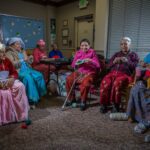Group therapy and education and support sessions are used within health care across a range of disciplines such as chronic disease self-management and psychotherapy interventions. However, there are barriers that constrain group attendance, such as mobility, time, and distance. Using videoconferencing may overcome known barriers and improve the accessibility of group-based interventions. The aim of this study was to review the literature to determine the feasibility, acceptability, effectiveness, and implementation of health professional led group videoconferencing to provide education or social support or both, into the home setting. Electronic databases were searched using predefined search terms for primary interventions for patient education and/or social support. Of the 1634 records identified, 17 were included in this review. Home-based groups by videoconferencing are feasible even for those with limited digital literacy. Overall acceptability was high with access from the home highly valued and little concern of privacy issues. Some participants reported preferring face-to-face groups. In conclusion, groups delivered by videoconference are feasible and potentially can improve the accessibility of group interventions. This may be particularly useful for those who live in rural areas, have limited mobility, are socially isolated, or fear meeting new people. Outcomes are similar to in-person groups, but future research on facilitation process in videoconferencing-mediated groups and large-scale studies are required to develop the evidence base.
Multimodal co-therapy for unaccompanied minors: A qualitative study.
Background Unaccompanied refugee minors—or unaccompanied minors—are children and adolescents who have been separated from parents and other relatives and are not being cared for by

